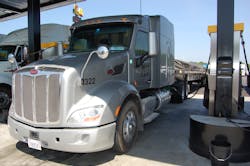National average retail pump prices for diesel stayed flat this week for the U.S., while the price for gasoline dropped, according the data tracked by the Energy Information Agency (EIA)
However, prices for both fuels fluctuated in different directions on a regional basis, the agency noted, with diesel prices increasing in five areas of the country while dropping in another five.
Diesel remained at $2.426 per gallon on a national basis this week, according to EIA’s numbers, which is 41.7 cents per gallon cheaper compared to the same week in 2015.
Diesel increased in five pricing regions of the U.S. the agency established for its fuel costing data, which were offset by price declines in other areas of the country:
- California: up 1.7 cents to $2.803 per gallon (the highest regional price for diesel in the U.S. this week)
- The Rocky Mountains: up 1.6 cents to $2.429
- The West Coast including California: up 7/10ths of a penny to $2.713 (with California removed, diesel dipped 6/10ths of a penny to $2.60 for the West Coast)
- The Midwest: up 3/10ths to $2.389
- The Lower Atlantic: up 3/10ths to $2.361
The national average retail pump price for gasoline dipped 2.4 cents to $2.329 per gallon this week, EIA said, which is 47.2 cents cheaper per gallon compared to the same week last year.
Gasoline prices increased in three of EIA’s pricing regions, while falling everywhere else:
- The West Coast: up 4.4 cents to $2.764 per gallon
- The West Coast without California’s prices: up 1.3 cents to $2.480
- The Gulf Coast: up 1/10th of a penny to $2.097
Interestingly, despite such price fluctuations, EIA argues in a new research paper that alternative fuels might witness far less demand in the future due to the fuel economy improvements mandated for medium- and heavy-duty heavy trucks via the Phase 2 standards within greenhouse gas (GHG) emission rules.
That paper explained that the “most significant effect” of the Phase 2 standards is a projected 18% drop in diesel consumption by medium- and heavy-duty vehicles by 2040.
Yet as fuel economy for diesel trucks increases due to the Phase 2 rules, EIA’s experts think there will be “less incentive to pay high capital costs for natural gas and propane vehicles” despite their lower fuel costs, resulting in a shift away from natural gas and propane back toward conventional diesel and gasoline-fired equipment.
That paper projects that consumption of “other fuels” by medium- and heavy-duty trucks – including gasoline, propane, liquefied natural gas (LNG), and compressed natural gas (CNG) – will drop precipitously by 2040, with diesel accounting for 90% of all fuel consumption by those vehicles, with the remainder consisting primarily of gasoline and a small amount of natural gas.
“The higher diesel share in the Phase 2 standards case reflects a shift away from alternative fuels as improved fuel economy reduces the incentive to pay high capital costs for natural gas and propane vehicles despite their lower fuel costs,” EIA noted.
About the Author
Sean Kilcarr
Editor in Chief
Sean Kilcarr is a former longtime FleetOwner senior editor who wrote for the publication from 2000 to 2018. He served as editor-in-chief from 2017 to 2018.
